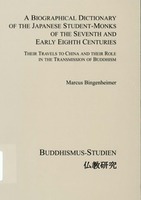
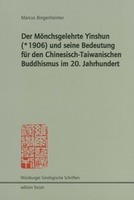
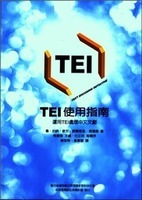
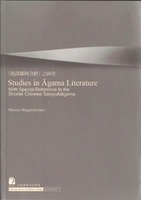
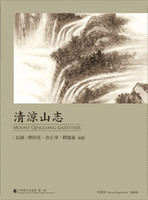
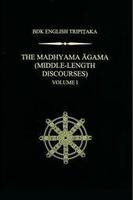
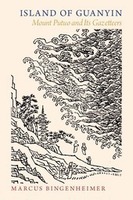
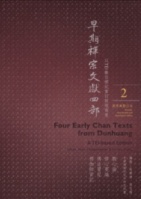
Marcus Bingenheimer 馬德偉 was born in Germany. He obtained an MA (Sinology) and Dr.phil (History of Religions) from Würzburg University, and an MA (Communication Studies) from Nagoya University. Marcus works as Associate Professor in the Department of Religion at Temple University in Philadelphia. He taught Buddhism and Digital Humanities in Taiwan at Dharma Drum (2005 to 2011), and held visiting positions and fellowships at universities in Korea, Japan, Thailand, France, and Singapore. Since 2001 he has supervised various projects concerning the digitization of Buddhist culture. His main research interests are the history and historiography of Buddhism, early sūtra literature, and how to apply computational approaches to research in the Humanities.
馬德偉(Marcus Bingenheimer)出生於德國。獲德國烏茲堡大學(Würzburg University)漢學碩士與宗教史博士,以及日本名古屋大學國際傳播學碩士。現為美國費城天普大學(Temple University)宗教系副教授。2005至2011年在臺灣教授佛學與數位人文學,並主持幾項關於佛教文化數位化計畫與TEI標準的中文翻譯相關計畫。馬博士曾在韓國、日本、泰國、新加坡和法國的大學擔任訪問職務和研究員。主要的研究領域為東亞佛教史,佛教史學,早期佛教經典與如何在人文學科中應用計算方法。
orcid.org/0000-0002-9102-9217 || GitHub
Research interests in Buddhist Studies include 佛學研究領域包含: History and historiography of Buddhism in East Asia 東亞佛教史與佛教史學 (e.g. 2001, 2004, 2007b, 2009a, 2013a, 2016, 2020b, 2021b, 2022c, 2023a), early Buddhist sūtra literature (Āgama/Nikāya) 早期佛經(阿含經,尼迦耶經)(e.g. 2011, 2011b, 2013, 2020a, 2023b), Buddhist pilgrimage 佛教朝山,進香,參學,巡禮 (2003b, 2004, 2016a, 2016b, 2017a, 2022a, 2022b, 2024b), whole-body relics 肉身菩薩 (2005, 2006c, 2006d).
Research interests in Digital Humanities include 數位人文學研究領域包含: Creation of high-end digital and print editions of ancient texts 古代經典數位化與數位編輯 (e.g. 2009, 2013a, 2014b, 2018), historical social networks 歷史網絡 (e.g. 2011a, 2018a, 2020b, 2021b, 2023a, 2023e), historical GIS 歷史地理 (2009c, 2010e, 2016a, 2022a, 2022b, 2024a), stylometrics & author-/translatorship attribution 文體計量與作者/譯者歸屬 (2009d, 2012c, 2017b, 2025a), machine translation of Buddhist text 佛典機器翻譯 (2023d, 2025b).
Nanyang GIS data pool. Collecting GIS layers for (mainly) overseas Chinese sites in Southeast Asia. Layers visualized here https://nanyang-data.info/.
Co-founder & Steering Committee (since 2019): Chinese Religious Text Authority.
Co-director (since 2015): The Database of Medieval Chinese Syntax. With Christoph Anderl and Ann Heirman (Ghent University)
Fellow of the Āgama Research Group.
(2022-23) PI: "In the footsteps of Wolfgang Franke - Chinese Temples in Bangkok." Project website (Bangkok temples in 3D). Data at https://nanyang-data.info/ and Zenodo. Project supported by a Visiting Research Fellowship at Thammasat University มหาวิทยาลัยธรรมศาสตร์. See Bingenheimer and McBain (2024).
(2022-23) PI: "A Translation of Wang Rixiu’s Longshu jingtuwen “Essays on the Pure Land from Longshu” (1162 CE)" Funded by an ACLS / Robert H. N. Ho Family Foundation Translation Grant.
(2019-2022) Co-PI: “Sutra2DNA – Exploring Digital Cultural Heritage Data Preservation via DNA Storage” [中文版] Encoding the Diamond Sutra in DNA and 3D printing a miniature stūpa to contain it. Dataset with some deliverables here. Funded by a Temple University Presidential Humanities and Arts Grant.
(2018-2020) Project director: "Chinese Buddhist History as Network(s)" Creation of a foundational dataset for historical social network analysis of Chinese Buddhism. In collaboration with the Chung-hwa Institute of Buddhist Studies. Resulting dataset (18,000+ nodes) on GitHub. Some supporting material here.
(2016-2019) Research Cluster Leader for From the Ground Up - Buddhism and East Asian Religions (FROGBEAR), Cluster 1.2 "Religion and Technology".
(2014-2017) Project director: "Four Early Chan Texts from Dunhuang - A TEI based Edition." Full-text digitization of selected Dunhuang manuscripts. Funded by the Chung-hwa Institute of Buddhist Studies, in collaboration with the International Dunhuang Project, British Library. Resulted in high-end digital editions of 43 Mss witnesses of four Early Chan texts. The texts are available online as part of the Database of Medieval Chinese Texts. The markup is documented in the Markup Manual. The XML/TEI Data is archived at Zenodo (DOI: 10.5281/zenodo.1133490).
(2010-2013) Project director: A Critical, Digital Edition of the Song gaoseng zhuan 宋高僧傳之校勘與數位化版本. Aims at a best edition and visualization of the Song gaoseng zhuan. Funded by the Chiang Ching-Kuo Foundation for International Scholarly Exchange 蔣經國國際學術交流基金會.(RG001-D-09)
(2008-2013) Project director: Digital Archive of Chinese Buddhist Temple Gazetteers 中國佛教寺廟志數位典藏 . Phase I (2008-2011): Digitization of 230+ Buddhist temple gazetteers 中國佛寺志. Funded by the Chung-hwa Institute of Buddhist Studies 中華佛學研究學院. Phase II (2011-2013): From TEI/XML back to print: Zhonghua fosizhi congshu 中華佛寺志叢書 (The Zhonghua Collection of Buddhist Temple Gazetteers) (s.b.).
(2008-2011) Managing director: Visualization platform for Buddhist Biographies 佛教傳記文學視覺化平台. The "One Dataset - Three Views" platform offers a GIS visualization and reading platform, a social network view, and a timeline view. Funded by the Haoran Foundation 浩然基金會.
(2008-2011) Project director: Glossaries for Buddhist Studies More glossaries are maintained here: https://github.com/mbingenheimer/buddhist_studies_glossaries
(2007-2011) Project director: Authority databases for person and place names in Buddhist sources and East Asian calendar data.
(2008-2010) Managing director: Spatio-temporal & image database of Buddhist Temples in Taiwan 台灣佛寺時空平台. Funded by the Haoran Foundation 浩然基金會.
(2007-2009) Project director: "Catalog Database of Republican Era Buddhist Journals 『民國佛教期刊文獻集成』 - 書目資料庫." A bibliographic database of more than 140,000 articles from Buddhist Journals of the Republican era.
(2007-2008) Project director: Full-text and image file archive of the Journal Taiwan Fojiao《臺灣佛教》 《臺灣佛教》期刊數位典藏. Taiwan Fojiao is an important source for the study of Taiwanese Buddhism between 1950 and 1970.
(2007-2008) Project director: Research Archive of Material on the Manchu Buddhist Canon 滿文藏經研究資料. Funded by the Li Chunjin Foundation 李春金關懷基金會.
(2006-2009) Project director: The Chinese Localization of the TEI Markup standard. See book publication 2009 below and this website. Funded by the Taiwan e-Learning and Digital Archives Program 數位典藏與數位學習國家型科技計畫.
(2005-2013) Co-editor and translator: A Translation of the Chinese Madhyama Āgama, the Zhong ahan jing 中阿含經 (T.26). Funded by the Numata Foundation 仏教伝道協会. Vol.1 (Sūtras 1–71) (2013) [On free download].
(2005-2008) Project director: A comparative edition and partial translation of an early Chinese Āgama sutra, the Bieyi za'ahan jing 別譯雜阿含經 (T.100), a project funded by the Chiang Ching-Kuo Foundation for International Scholarly Exchange 蔣經國國際學術交流基金會 (RG005-D-04).
 |
 |
 |
 |
 |
 |
 |
 |
2018: Marcus Bingenheimer 馬德偉, Chang Po-Yung 張伯雍 (eds.): Four Early Chan Texts from Dunhuang – A TEI-based Edition 早期禪宗文獻四部 —— 以TEI標記重訂敦煌寫卷:楞伽師資記,傳法寶紀,修心要論,觀心論. Taipei: Shin Wen Feng 新文豐.
Vol. 1: Facsimiles and Diplomatic Transcription 摹寫版 (ISBN: 978-957-17-2274-0), Vol. 2: Parallel, Punctuated and Annotated Edition 對照與點注版 (ISBN: 978-957-17-2275-7), Vol. 3: Calligraphy Practice 抄經版 (ISBN: 978-957-17-2276-4). XML/TEI Data archived at Zenodo (DOI: 10.5281/zenodo.1133490). Can be ordered at the 新文豐 website. English intro here [pdf].
2016: Island of Guanyin - Mount Putuo and its Gazetteers. London & New York: Oxford UP. [OUP Website], [Amazon]. ISBN-13: 978-0190456191.
[Reviewed by: J. Eichman on Reading Religion; C. Bruntz in Studies in Chinese Religions Vol.3-2 (2017): 194–196; O. Milburn in T'oung Pao Vol. 103-4-5 (2017): 498-501; A. Grydehøj in Island Studies Journal Vol.13 (1) (2018): 303-304; P. Crowe in Religious Studies and Theology Vol.39 (1) (2020): 132–134; T. Brook in Journal of Religious History Vol.45-2 (2021-06): 337-338.]
2013 (a) (Editor-in-chief (總編輯)): Zhonghua fosizhi congshu 中華佛寺志叢書 // The Zhonghua Collection of Buddhist Temple Gazetteers. No.1-12. Taipei: Shin Wen Feng 新文豐. c. 4850 pgs. Buy at Shin Wen Feng ISBN (Series): 978-957-17-2177-4
A 15 volume edition series of 12 temple gazetteers (15th to early 20th century) with introductions, modern punctuation, common era dates, detailed place and person name indices. For a description of the editorial principles see Editorial Principles (中文凡例), for a general introduction to the edition project see the Series Preface (中文通序)
The collection contains the following gazetteers: No. 1: 清涼山志 Mount Qingliang Gazetteer, No. 2: 峨眉山志 Mount Emei Gazetteer, No. 3: 重修普陀山志 Revised Gazetteer of Mount Putuo, No. 4: 普陀洛迦新志 New Gazetteer of Mount Putuo (2 Vols.), No. 5: 九華山志 Mount Jiuhua Gazetteer, No. 6: 天台山方外志 Mount Tiantai Gazetteer (2 Vols.), No. 7 A: 明州阿育王山志 Aśoka Temple Gazetteer, No. 7 B: 明州阿育王山續志 Continued Aśoka Temple Gazetteer, No. 8: 寒山寺志 Hanshan Temple Gazetteer, No. 9: 玉岑山慧因高麗華嚴教寺志 Huiyin Temple Gazetteer, No. 10: 黃檗山志 Mount Huangbo Gazetteer, No. 11: 泉州開元寺志 Kaiyuan Temple Gazetteer, No. 12: 雞足山志 Mount Jizu Gazetteer. Can be ordered at the 新文豐 website.
2013 (b) (Editor-in-chief, Translator): The Madhyama Āgama (Middle Length Discourses). Vol.1 Berkeley, CA: Numata Center for Buddhist Translation & Research. 588 pgs.
Co-editors: Ven. Anālayo, Roderick Bucknell. The first of three volumes with the first English translation of the Zhong ahan jing 中阿含經 (T.26). This volume covers Vaggas 1-8, Fascicles 1-16, Sutras 1-71. On Amazon. ISBN: 978-1-886439-47-4.
2011: Studies in Āgama Literature - With special reference to the Shorter Chinese Saṃyuktāgama. Taipei: Shin Wen Feng 新文豐. 345 pgs. ISBN: 978-957-17-2139-2.
Can be ordered from the 新文豐 website or downloaded here as PDF [2.3 MB].
[Reviewed by Michael Radich (Journal of Chinese Religions, 41.1 (2013): 62-64). Central hypothesis critically examined by Roderick Bucknell (Chung-hwa Buddhist Journal Vol. 24 (2011): 35-70).]
2009 (Editor-in-chief (總編輯) under the name 馬德偉): TEI shiyong zhinan - yunyong TEI chuli zhongwen wenxian TEI 使用指南──運用TEI處理中文文獻 [Chinese TEI – A guide to using TEI with Chinese texts].
Taipei: Taiwan E-learning and Digital Archive Program 數位典藏與數位學習國家型科技計畫. 384 pgs. ISBN:978-986-01-8092-3.
This is the Chinese localization of the Text Encoding Initiative (TEI) markup standard. Download the book as PDF [7.5 MB]. Here is the introductory chapter in English. See the Chinese TEI website for more material on the standard.
2004: Der Mönchsgelehrte Yinshun (*1906) und seine Bedeutung für den Chinesisch-Taiwanischen Buddhismus im 20. Jahrhundert. [The Scholar Monk Yinshun 印順 – His Relevance for the Development of Chinese and Taiwanese Buddhism.]
Heidelberg: Edition Forum (Würzburger Sinologische Schriften). 343 pgs. ISBN: 3-927943-26-6. The book is out of print, here is a (slightly revised) PDF-version.
[Reviewed by Philip Clart (March 2005)]
2001: A Biographical Dictionary of the Japanese Student-Monks of the Seventh and Early Eighth Centuries. Their Travels to China and their Role in the Transmission of Buddhism.
München: Iudicium (Buddhismus-Studien / Buddhist Studies 4). 138 pgs. ISBN: 3-89129-693-2. The book is out of print, here is a PDF-version.
2023: Marcus BINGENHEIMER (Guest Editor): Religions Special Issue on “Historical Network Analysis in the Study of Chinese Religion.” ISSN: 2077-1444. Open Access.
2020: Marcus BINGENHEIMER, Christian WITTERN, Jinhua CHEN (Guest Editors): Journal of the Japanese Association of the Digital Humanities - Special Issue: Buddhism and Technology. Vol. 5-2. ISSN: 2188-7276. Open Access.
2012: Christoph ANDERL, Christian WITTERN, Marcus BINGENHEIMER (Guest Editors): Chung-hwa Buddhist Journal - Special Issue: Digital Text and Digital Resources. Vol. 25. Free Access.
(in work) “Uses of Biography in Wang Rixiu’s Essays on the Pure Land from Longshu”
(in work) Marcus BINGENHEIMER, Justin BRODY “Further Experiments in Distant Reading: Using Topic Modeling on Machine Translated Chinese Buddhist Texts”
(in work) Marcus BINGENHEIMER, Lu HUANG ““Progressives” vs. “Conservatives” and their Intermediaries in the Epistolary Network of Republican-era Chinese Buddhism”
(in work) “Relic pilgrimage and the Chinese Zodiac in Lanna Buddhism - the case of the Wat Phrathat Pracham Pikeot พระธาตุประจำปีเกิด.”
[70] 2025 (a): Marcus BINGENHEIMER, Justin BRODY, Ryan NICHOLS: “Experiments in Distant Reading: Using Topic Modeling on Chinese Buddhist Texts from 500-800 CE” Digital Humanities Quarterly 19.1 [open access].
2025 (b): - Sebastian NEHRDICH, Avery CHEN, Marcus BINGENHEIMER, Lu HUANG, Rouying TANG, Xiang WEI, Leijie ZHU, Kurt KEUTZER: “MITRA-zh-eval: Using a Buddhist Chinese Language Evaluation Dataset to Assess Machine Translation and Evaluation Metrics” Proceedings of the 5th International Conference on Natural Language Processing for Digital Humanities (NLP4DH 2025), pp.129-137. [PDF]
2025 (c): as 马德伟: “我今有一襦,非罗复非绮。 借问作何色,不红亦不紫。[Ten Questions and Answers]” in Li Mingjia 李銘佳 et al. (eds.). 2025. Shi Wen - Foxue yanjiu qingnian fangtanlu 十问 佛学研究青年访谈录 [Ten Questions to Scholars of Buddhism]. Beijing: Zongjiao wenhua 宗教文化出版社. pp. 342-349.[PDF]
2024 (a): Marcus BINGENHEIMER, Paul MCBAIN: “In the Footsteps of Wolfgang Franke – Revisiting and Surveying Chinese Temples in Bangkok” Journal of the Siam Society Vol.112-1: 49–70. Open Access [Journal], local PDF [article, appendices]. Survey data on Zenodo and at https://nanyang-data.info/.
2024 (b): “Strangers in Paradise - Foreign Visitors on Mount Putuo in the Late Qing” In: Jinhua Chen and Dewei Zhang (ed.) Religions and Local Society in Historical, Comparative, and Theoretical Perspectives: A Festschrift in Honour of Timothy Brook, Singapore: World Scholastic Publishers, pp.97-128. [PDF]
[65] 2023 (a): “Miyun Yuanwu 密雲圓悟(1567–1642) and His Impact on 17th‑Century Buddhism.” Religions 14, 248. pp.1-17. DOI: https://doi.org/10.3390/rel14020248, [PDF]. Part of the Special Issue on Historical Network Analysis in Chinese Religion.
2023 (b): “A late Mahāyāna text on Being without Self – With special reference to the Chinese versions of the Nairātma-paripṛcchā (T. 846, T. 1643).” Buddhist Studies Review Vol. 40-1: 3-26. DOI: https://doi.org/10.1558/bsrv.21811.
2023 (c): as 马德伟: “Lishi shehuiwangluo fenxi zai Zhongguo fojiao yanjiu zhong de yingyong – Dao’an, Huiyuan, Kumārajīva de anlie 历史社会网络分析在中国佛教研究中的应用 —— 道安、慧远、鸠摩罗什的案例” Fojiao yanjiu 佛学研究 2023 Vol. 38-1: 179-208. Translation of 2020 (b). Translated by Tang Rouying 唐柔莹 & Wei Xiang 魏翔. [PDF]
2023 (d): Sebastian NEHRDICH, Marcus BINGENHEIMER, Justin BRODY, Kurt KEUTZER: “MITRA-zh: An efficient, open machine translation solution for Buddhist Chinese.” Proceedings of the Joint 3rd NLP4DH and 8th IWCLUL, pp. 266–277. [PDF].
2023 (e): “Special Issue 'Historical Network Analysis in the Study of Chinese Religion' —Introduction.” Religions 14, 248. pp.1-6. DOI: https://doi.org/10.3390/rel14121543, [PDF]. Part of the Special Issue on Historical Network Analysis in Chinese Religion.
[60] 2022 (a): “Traversing the ‘Pilgrimage Square’ of Northern China in the 19th Century.” In: Jiang Wu (ed.), The Formation of Regional Religious Systems in Greater China, pp.73-92. New York: Routlegde. DOI: 10.4324/9781003214847-6.
2022 (b): “Changing Pilgrimage Routes in the Late Qing – Comparing the itinerary networks in Knowing the Paths of Pilgrimage 參學知津 (c.1827) and Record of Travels to Famous Mountains 名山遊訪記 (c.1918).” In: Vincent Goossaert and Tsuchiya Masaaki (eds.) Lieux saints et pèlerinages: la tradition taoïste vivante / Holy sites and pilgrimages: The Daoist Living Tradition, pp. 393-408. Turnhout: Brepols. ISBN: 978-2-503-59916-8. Pre-print here DOI: https://doi.org/10.1484/M.BEHE-EB.5.130249.
2022 (c): “Monastic biography in the Ming and Qing: The case of Shi Zhenqing 釋真清 (1537-1593)” Journal of Chinese Buddhist Studies 中華佛學學報 Vol. 35, pp. 59-107. PDF.
2021 (a): “Digital Tools for Buddhist Studies” In: Christopher D. Cantwell and Kristian Petersen (eds.), Digital Humanities and Research Methods in Religious Studies, pp.1-31. Berlin/Boston: DeGruyter. ISBN: 978-3110571608. DOI: 10.1515/9783110573022-002
2021 (b): “The Historical Social Network of Chinese Buddhism” Journal of Historical Network Research Vol. 5: 233-247. Open Access. DOI: https://doi.org/10.25517/jhnr.v5i1.119. (Special Issue Beyond Guanxi: Chinese Historical Networks, ed. H. Rudolph and S. Chen). [PDF]
[55] 2020 (a): “A Study and Translation of the Yakṣa-saṃyukta in the Shorter Chinese Saṃyukta-āgama.” In: Dhammadinnā (ed.), Research on the Saṃyukta-āgama. Taipei: Dharma Drum Publishing Corporation, pp.763-841. [PDF]
2020 (b): “On the Use of Historical Social Network Analysis in the Study of Chinese Buddhism: The Case of Dao’an, Huiyuan, and Kumārajīva” Journal of the Japanese Association for Digital Humanities Vol.5-2 (2020): 84-131. (Special Issue on “Buddhism and Technology”). DOI: https://doi.org/10.17928/jjadh.5.2_84. [PDF]
2020 (c): Marcus BINGENHEIMER, Ting SHEN: “The portrayal of women in the poetry of Jing’an Eight-Fingers” Studies in Chinese Religions Vol.6-2 (2020): 1-22. DOI: 10.1080/23729988.2020.1763680. [PDF]
2020 (d): “Digitization of Buddhism (Digital Humanities and Buddhist Studies)” Oxford Bibliographies Online In Oxford Bibliographies in Buddhism. Ed. Richard Payne. New York: Oxford University Press. DOI: 10.1093/obo/9780195393521-0265. [PDF]
2020 (e): Duoduo XU, Kenneth DEAN, Marcus BINGENHEIMER, Francis BOND: “Chinese Singaporean Temples: Digital Humanities Approaches to Frequency Lists of Sponsors.” 數位典藏與數位人文 5 期(2020 年 4 月)Journal of Digital Archives and Digital Humanities No. 5 (April, 2020), pp. 37-72. DOI:10.6853/DADH.202004_(5).0002. [PDF]
[50] 2020 (f): “Introduction” Special Issue on “Buddhism and Technology” Journal of the Japanese Association for Digital Humanities Vol.5-2 (2020): 1-5. DOI: https://doi.org/10.17928/jjadh.5.2_1. [PDF]
2019 (a): “Yinshun” in J.Silk (ed.) Brill's Encyclopedia of Buddhism Vol.2, pp.795-800.
2019 (b): Oliver STREITER, Marcus BINGENHEIMER, Hanna Ya-qing ZHAN, Mandy Manwai TO, Syuan-fei SHIH: “First Steps towards Reviving Franke’s ‘Chinese Epigraphy in Southeast Asia’: Motivations, Approaches and Data Structures” in O. Streiter, M. To, J. Morris (eds.) Proceedings DRGPA (Documenting and Researching Graveyards in Pacific Asia) 2019, pp. 91-118. [PDF proceedings], [PDF paper].
2018 (a): “Who was ‘Central’ for Chinese Buddhist History? - A Social Network Approach.” International Journal of Buddhist Thought and Culture. Vol.28-2 (Dec. 2018): 45-67. Open Access Journal Issues. DOI: 10.16893/IJBTC.2018.12.28.2.45. [PDF]
2018 (b): “Digitization of Buddhist Cultural Heritage.” IIAS (International Institute for Asian Studies) Newsletter No.79 (Spring 2018): 20. Section PDF.
[45] 2017 (a): “Pilgrimage in China.” in: Albera, Dionigi, John Eade (eds.) New Pathways in Pilgrimage Studies: Global Perspectives. (Routledge Studies in Pilgrimage, Religious Travel and Tourism), pp. 18-35. [PDF]
2017 (b): Marcus BINGENHEIMER, Jen-Jou HUNG, Cheng-en HSIEH: “Stylometric Analysis of Chinese Buddhist texts - Do different Chinese translations of the Gaṇḍavyūha reflect stylistic features that are typical for their age?” Journal of the Japanese Association for Digital Humanities Vol. 2 (2017): 1-30. DOI: 10.17928/jjadh.2.1_1. Open Access at the Journal Website or [PDF].
2017 (c): “Two Sūtras on Healing and Healers from the Chinese Canon” In: Salguero, Pierce (ed.) Buddhism & Medicine: An Anthology of Premodern Sources, New York: Columbia University Press, pp. 163-170. [PDF]
2017 (d): Pierce SALGUERO, Robban TOLENO, William GIDDINGS, Joshua CAPITANIO, and Marcus BINGENHEIMER: “Buddhist Medicine in the Buddhist Canon: Selected Translations.” Asian Medicine 12 (2017): 1–18. DOI: 10.1163/15734218-12341397. [PDF]
2016 (a) “‘Knowing the Paths of Pilgrimage’ - The Network of Pilgrimage Routes in 19th century China according to the Canxue zhijin 參學知津.” Review of Religion and Chinese Society Vol. 3-2 (Issue on Geospatial Studies on Chinese Religions): 189-222. Pre-print.
[40] 2016 (b): “The General and the Bodhisattva – Commander Hou Jigao Travels to Mount Putuo.” Journal of Chinese Buddhist Studies Vol.29 (2016): 129–161. Available on the journal website or [PDF].
2016 (c): Marcus BINGENHEIMER, Jen-Jou HUNG, Simon WILES, Boyong ZHANG. “Modeling East Asian Calendars in an Open Source Authority Database.” International Journal of Humanities and Arts Computing Vol. 10-2, pp. 127-144. DOI: 10.3366/ijhac.2016.0164. [PDF]
2016 (d): Kin CHEUNG, Adam VALERIO, Vishma KUNU, Marcus BINGENHEIMER. “Chinese Religion(s): A Survey of Textbooks.” Studies in Chinese Religions Vol. 2-3 (2016): 315-328. [PDF]
2015: “The Digital Archive of Buddhist Temple Gazetteers and Named Entity Recognition (NER) in Classical Chinese.” Lingua Sinica 1:8 (2015), pp. 1-19. DOI: 10.1186/s40655-015-0007-3. [Springer link], [PDF].
2014 (a): “The History of the Manchu Buddhist Canon and First Steps towards its Digitization.” Central Asiatic Journal Vol. 56 (2012/2013), pp. 203-217. ISSN: 0008-9192. [PDF].
[35] 2014 (b): “Collation strategies for the Buddhist canon - As seen in the frequency and impact of character variance in canonical editions of the Song Gaoseng Zhuan 宋高僧傳 (T.2061).” Journal of East Asian Publishing and Society Vol. 4-2 (2014), pp. 155-174. DOI: 10.1163/22106286-12341260]. [PDF].
2013: “Two Sūtras in the Chinese Saṃyuktāgama without Direct Pāli Parallel – Some remarks on how to identify ‘later additions’ to the corpus.” Buddhist Studies Review Vol. 30-2, pp. 201-214. DOI: 10.1558/bsrv.v30i2.201. Self-archived [PDF].
2012 (a): “Bibliographical Notes on Buddhist Temple Gazetteers, their Prefaces and their Relationship to the Buddhist Canon.” Chung-hwa Buddhist Journal 25 (2012), pp. 49-84. ISSN:1017-7132. Available online PDF or at the Journal website.
2012 (b): Marcus BINGENHEIMER, Jen-Jou HUNG, Cheng-en HSIEH. “Do different Chinese translations of the ‘Gandhavyūha’ reflect stylistic features that are typical for their age?” In: Jan C. MEISTER (ed.) Digital Humanities 2012 Conference Abstracts. Hamburg: Publishing House of the Hamburg State and University Library, 2012, pp. 115-116. ISBN 978-3-937816-99-9. [PDF] (Refereed Abstract)
2012 (c): Jen-Jou HUNG, Marcus BINGENHEIMER, Jieli KWOK. “A Computer-Based Approach for Predicting the Translation Time Period of Early Chinese Buddhism Translation” In: Jan C. MEISTER (ed.) Digital Humanities 2012 Conference Abstracts. Hamburg: Publishing House of the Hamburg State and University Library, 2012, pp. 230-231. ISBN 978-3-937816-99-9. [PDF] (Refereed Abstract)
[30] 2012 (d):빈겐하이머, 마르쿠스 (Marcus Bingenheimer). 2012. “Chung’guk pulgyo, nalgae rul dalda 중국불교, 날개를 달다” Pulgwang yŏng’guwŏn 불광연구원 (Eds.). In: Taeman pulgyo ŭi 5 kaji songgong kodŭ 대만불교의5가지성공코드 [Five reasons for the success of Taiwanese Buddhism]. Seoul: Pulgwang Publishers. pp. 39-68. ISBN: 978-89-7479-032-5. Korean translation (by Lee Sangyop 이상옙) of 2003 (c). [PDF (4 MB)].
2011 (a): Marcus BINGENHEIMER, Jen-Jou HUNG, Simon WILES: "Social Network Visualization from TEI Data." Literary and Linguistic Computing 26(3), 2011, pp. 271-278. DOI: 10.1093/llc/fqr020. (SSCI) [PDF].
2011 (b): “Guanyu Bieyizaahanjing shuyu Yinguangbu songben de wenti 關於《別譯雜阿含經》屬於飲光部誦本的問題.” Hanyu foxue pinglun 汉语佛学评论 Vol.3 (2011): 187-198.
2011 (c): 洪振洲 Jen-Jou HUNG, 馬德偉 Marcus BINGENHEIMER, 許智偉 Jr-Wei SHIU: “Taiwan fojiao wenhua shuwei dianzang zhi fazhan 台灣佛教文化數位典藏之發展 - Digital Archives for the Study of Taiwanese Buddhism.” 教育資料與圖書館學 / Journal of Educational Media and Library Sciences Vol. 49:1 (49卷1期) (Fall 2011), pp. 103-133. ISSN: 1013-090X. [PDF] or journal website.
2011 (d): 洪振洲 Jen-Jou HUNG, 馬德偉 Marcus BINGENHEIMER, 張伯雍 Bo-Yong ZHANG, 李志賢 Jhih-Sian LEE, 黃仁順 Ren-shun HUANG: “Fojiao shuwei dianzang yu GIS jishu yingyong jingyan fenxiang 佛教數位典藏與GIS 技術應用經驗分享 [Using GIS Technology in Buddhist Digital Archive Projects]” In: Xiang, Jie 項潔 (Ed.):Cong baocun dao chuanzao: kaiqi shuwei renwen yanjiu《從保存到創造:開啟數位人文研究》(From Preservation to Knowledge Creation: The Way to Digital Humanities). Taipei: National Taiwan University Press 台灣大學出版中心,2011,pp. 147-167. [PDF]
[25] 2010 (a): “Problems and Prospects of Collaborative Edition and Translation Projects in the Era of Digital Text.” In: Meisig, Konrad (Ed.): Translating Buddhist Chinese: Problems and Prospects. Wiesbaden: Harrassowitz, pp. 21-43. (East Asia Intercultural Studies 3) ISBN: 978-3-447-06267-1. [PDF]
2010 (b): “Zhongguo fosizhi chutan ji shumu yanjiu 中國佛寺志初探及書目研究.” Hanyu foxue pinglun 汉语佛学评论 Vol.2 (2010), pp. 377-408. [PDF].
2010 (c): Marcus BINGENHEIMER; Jen-Jou HUNG. “A Digital Archive of Buddhist Temple Gazetteers.” Digital Humanities 2010 Conference Abstracts. London: King's College London, 2010, p.282-284. ISBN 978-0-9565793-0-0. [PDF].
2010 (d): 洪振洲 Jen-Jou HUNG, 馬德偉 Marcus BINGENHEIMER, 許智偉 Zhi-Wei XU: “漢文佛典的語意標記與應用:《高僧傳》文獻的時空資訊視覺化和語意搜尋 - Semantic markup for Chinese Buddhist texts and its Application- A Platform for Querying and Spatio-temporal Visualization of the Biographies of Eminent Monks”, (國立政治大學) 圖書與資訊學刊 (National Chengchi University) Journal of Librarianship and Information Studies. Vol.2, No.3 (No.74), Aug 2010, pp.1-24. ISSN: 1023-2125. [Pre-print]
2010 (e): Jen-Jou HUNG, Marcus BINGENHEIMER, Simon WILES: “Digital Texts and GIS: The interrogation and coordinated visualization of Classical Chinese texts.” Proceedings International Conference on Computer Design and Applications ICCDA 2010.vol 1, pp.453-458. ISBN: 978-1-4244-7163-8 (EI). (Refereed Abstract)
[20] 2010 (f): Jen-Jou HUNG, Marcus BINGENHEIMER, Simon WILES: “Text Query and Concurrent Geographical Visualization a Novel Interface Design using Open Source Technologies.” Poster Proceedings of the IEEE Pacific Visualization Symposium 2010, pp. 21-22. (Refereed Abstract)
2009 (a): “Writing history of Buddhist thought in the 20th century – Yinshun (1906-2005) in the context of Chinese Buddhist Historiography.” Journal of Global Buddhism Vol.10 (2009), pp.255-290. ISSN: 1527-6457. HTML version at the Journal of Global Buddhism website and local PDF.
2009 (b): “More Suttas on Sakka and why the Shorter Chinese Saṃyukta-āgama should not be attributed to the Kāśyapīya school” Buddhist Studies Review, 26-2 (2009), pp.127–153. ISSN: 0265-2897, DOI: 10.1558/bsrv.v26i2.127.
2009 (c): Marcus BINGENHEIMER, Jen-Jou HUNG, Simon WILES: “Markup meets GIS - Visualizing the ‘Biographies of Eminent Buddhist Monks’.” In: 13th International Conference on Information Visualisation, IV 2009, 15-17 July 2009, Barcelona, Spain. Edited by Banissi, E.; Stuart, L.J.; Wyeld, T.G.; Jern, M.; Andrienko, G.; Menon, N.; Alhajj, R.; Burkhard, R.A.; Grinstein, G.G.; Groth, D.P.; Ursyn, A.; Johansson, J.; Forsell, C.; Cvek, U.; Trutschl, M.; Marchese, F.T.; Maple, C.; Cowell, A.J.; Vande Moere, A. Piscataway/NJ: IEEE Computer Society, pp.550-554. ISBN: 978-0-7695-3733-7, DOI: 10.1109/IV.2009.91. [PDF]
2009 (d): Jen-Jou HUNG, Marcus BINGENHEIMER, Simon WILES: “Quantitative Evidence for a Hypothesis regarding the Attribution of early Buddhist Translations.” Literary and Linguistic Computing (2010) 25(1): 119-134. First published online November 16, 2009. DOI: 10.1093/llc/fqp036. (SSCI)
[15] 2008 (a): “The Suttas on Sakka in Āgama and Nikāya Literature – with some remarks on the attribution of the Shorter Chinese Saṃyukta Āgama.” Buddhist Studies Review, 25-2 (2008), pp.149-173. ISSN: 0265-2897
2008 (b): “The Bhikṣuṇī Saṃyukta in the Shorter Chinese Saṃyukta Āgama.” Buddhist Studies Review, 25-1 (2008), pp.5-26. ISSN: 0265-2897
2007 (a): “Māra in the Chinese Saṃyuktāgamas.” Buddhist Studies Review, 24-1 (2007), pp. 46-74. ISSN: 0265-2897
2007 (b): “Some Remarks on the Usage of Renjian Fojiao 人間佛教 and the Contribution of Venerable Yinshun to Chinese Buddhist Modernism.” In: Development and Practice of Humanitarian Buddhism: Interdisciplinary Perspectives. Mutsu Hsu, Jinhua Chen, and Lori Meeks (Eds.). Hua-lien (Taiwan): Tzuchi University Press, 2007, pp. 141-161. ISBN: 978-986-7625-08-3 . [PDF (scan)]
2006 (a): “The Bieyi za ahan jing – Preliminary Findings.” Buddhist Studies Review, vol.23-1 (2006), pp.21-60. ISSN: 0265-2897. Part of the BZA project.
[10] 2006 (b): Justin RITZINGER, Marcus BINGENHEIMER: “Whole Body Relics in Chinese Buddhism – Previous Research and Historical Overview.” The Indian International Journal of Buddhist Studies No.7 (2006), pp.37-94. ISSN: 0972-4893. [pdf version 1 (2006)]
2006 (c): “Roushen pusa and Corpus Integrum – Whole Body Relics in Buddhism and Christianity.” In: Kalpakam Sankarnarayan (Ed.): The Contribution of Buddhism to World Culture. Mumbai: Somaiya Publications, pp.275-299. ISBN 817039263-2. [pdf Version 2 (2005)]
2006 (d): “A Study of Buddhist Chinese – A digital Comparative Edition of the Bieyi zaahan jing (T.100) with English Translation.” In: Association of Digital Humanities Organizations (ed.) Digital Humanities 2006 Conference Abstracts. Paris 2006, pp. 292-293. [pdf here] (Refereed)
2005: Douglas GILDOW, Marcus BINGENHEIMER: “Buddhist Mummification in Taiwan – Two Case Studies.” Asia Major 3rd Series vol.XV Part 2 (2002). ISSN:0004-4482. PDF available at the Asia Major website
2004: “A Translation of the Tōdaiwajō tōseiden 唐大和上東征傳.” (Part 2) The Indian International Journal of Buddhist Studies No.5 (2004), 142-181. ISSN: 0972-4893. Revised [pdf Version 1 (2008)] here.
[5] 2003 (a): “Issues in the Use of Electronic Markup for the Comparative Analysis of Āgama Literature.” Chung-hwa Buddhist Studies 7 (2003), 361-383. ISSN: 1026-969X. The proposal outlined later became the BZA project.
2003 (b): “A Translation of the Tōdaiwajō tōseiden 唐大和上東征傳.” (Part 1) The Indian International Journal of Buddhist Studies No.4 (2003), 168-189. ISSN: 0972-4893. Annotated translation of the journey of the monk Jianzhen 鑑真 (jpn. Ganjin) to Japan. Revised [pdf Version 1 (2008)].
2003 (c): “Chinese Buddhism Unbound - Rebuilding and Redefining Chinese Buddhism on Taiwan.” In: Kalpakam Sankarnarayan (Ed.): Buddhism in Global Perspective. New Delhi: Somaiya Publications, 2003. Vol.2, 122-146. ISBN 81-7039-260-8.
2002: “Kulturelle Identität aus Buddhistischer Sicht – Alte Erfahrungen einer Weltreligion mit der Gegenwart.” Fu Jen University (Hrsg.): Globalisierung und Identität. Taipei: Fu Jen University, 2002, 292-308. ISBN: 957-0439-41-6.
[1] 1997: “秋田武松 - 深海魚 - Akita Takematsu, ein Fisch der Tiefe.” Kotoba no Kagaku ことばの科学 No.10 (1997) (Nagoya Daigaku Gengobunkabu 名古屋大学言語文化部), p.135-163.
“Buddhist Historiography in China.” By John Kieschnick. Hualin International Journal of Buddhist Studies 6.1 (2023): 379–385. DOI: https://dx.doi.org/10.15239/hijbs.06.01.09
“Building the Buddhist Revival: Reconstructing Monasteries in Modern China.” By Gregory Adam Scott. Review of Religion and Chinese Society Vol. 8 (2021) : 143-147.
“Jenseits von Rom und Karl dem Großen. Aspekte der globalen Verflechtung in der langen Spätantike, 300–800 n. Chr.” by Johannes Preiser-Kapeller. Wien 2018. ISBN 978-3-85476-554-7, In: H-Soz-Kult, 04.04.2019. [www.hsozkult.de/publicationreview/id/reb-27512].
“Buddhist Stone Sutras in China, Sichuan Province” Vols. 1-3. by Lothar Ledderose, Suey-ling Tsai, Claudia Wenzel, and Hua Sun. T’oung Pao Vol. 104-1-3 (2018): 196-200.
“Reinventing the Tripitaka - Transformation of the Buddhist Canon in Modern East Asia” by Jiang Wu and Greg Wilkinson. Reading Religion, 2017 (online).
“Social Media in Industrial China” by Xinyuan Wang. Material Religion Vol. 13 (2017): 392-393. (DOI: 10.1080/17432200.2017.1309183)
“Spreading Buddha’s Word in East Asia: The Formation and Transformation of the Chinese Buddhist Canon” by Jiang Wu and Lucille Chia. The Journal of Chinese Religion Vol. 45-1 (2017), pp. 116-118. (DOI: http://dx.doi.org/10.1080/0737769X.2017.1299406)
“Heart of Buddha, Heart of China: The Life of Tanxu, a Twentieth Century Monk” by James Carter. Journal of Chinese Religion Vol. 40 (2012): 97-99.
“Burning for the Buddha” by James A. Benn. The Journal of Religion Vol. 88 (April 2008): 269–270.
“The Politics of Buddhist Organizations in Taiwan” by André Laliberté. Pacific Affairs Vol. 78 (July 2005): 300-301.
see Tools for Buddhist Studies